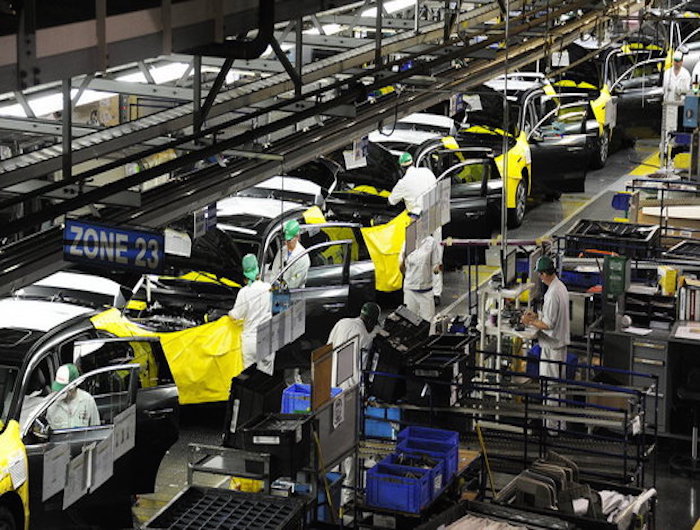Originally published in Automotive News
By Daron Gifford
It’s cold comfort to the auto supply industry that its current brain drain is a sign of a bright future. Top talent isn’t abandoning the automotive industry, necessarily. It’s just moving to the innovators in the car market, many of them makers of self-driving and electric cars.
This is happening even as traditional automakers aim to compete with and perhaps join this automotive avant-garde.
As unlikely as it might have been for a young mechanical engineer to imagine herself or himself someday working for Google or Apple, that’s what’s happening. There is a finite pool of talent, and for now, at least, it’s the supply industry that is experiencing outflow. For instance, battery firm A123 Systems and Apple earlier this year settled a suit where A123 claimed the iPhone maker was aggressively poaching its engineers.
It’s not like the old machine assembly line days. Today, it’s highly automated, and the backbone positions are the men and women who build and maintain robots and other highly sophisticated technology on today’s factory floor. The need now, and even more so in the future, is skilled workers — those with engineering, tooling and precision machining backgrounds. There’s a huge shortage in software development, too. For instance, earlier this month, the autopilot manager at Tesla Motors was reported to have moved to Google Robotics.
For suppliers, the challenge will be to produce higher quality parts to keep up with an increasingly technology-based industry, while competing for talent with Google, Apple and Tesla, all of whom are just as talent hungry as the Detroit 3.
In the past, suppliers have had to work hard to retain top talent, fighting the perception of distinct lags exist in pay and benefits, education opportunities, and job satisfaction. Such conditions are blood in the water for headhunters, who lately have been taking in commissions with both hands, as the mindset in the supply industry has been to compete with its products — not for its engineers.
Some suppliers have figured this out but are at a loss on what to do about it. Beyond a corporate and product strategy, these companies desperately need a talent strategy. Here are some areas of focus:
Self-awareness
The first step is always awareness. And a frank view of your position in the market is critical.
Companies that don’t see this trend, or believe they’re untouchable, are swimming blindly in a shark tank. This wave of poaching hasn’t come close to cresting, and companies that don’t safeguard against it face a future with not only the wrong type of employees, but also the inability to attract the right ones.
It will happen slowly, a departure here, and then another there. It can be a while before companies wake up to the fact their talent has been gutted.
Retention is more cost effective than recruiting, of course. Who can’t be lost? And if they present an outside offer, what are you willing to do to keep them?
Competitive position
Next, what of the competition, which could be anyone from your biggest customers, to your suppliers to companies in Silicon Valley? How are they fixed for talent? Where are their gaps and gluts? A company without that awareness will be ripe for poaching, and will be unable defend themselves. The awareness of talent in the industry would also allow you the ability to cherry pick from others.
Suppliers also need a clear understanding of the market’s shifting priorities.
If a supplier puts its strongest team on a specific category of product, the question becomes: What is the future of that product? Will it continue to command a premium in an industry? As core competencies evolve, so must the talent.
Outsourcing as an option
Options exist beyond throwing money at the problem. Outsourcing can work in non-strategic areas. The headaches that come with recruiting — finding team players who will contribute at a fair wage — become someone else’s headaches. But outsourcing is not a silver bullet for the core business.
Creating a sense of value among the workers is crucial for retention, too. Employees who feel like they are building a company and a future as well as a product won’t be as quick to jump for a simple salary bump.
Remove cultural obstacles
Don’t dismiss the value of a hard look in the mirror, either. Ford Motor Co. was notorious for a corporate culture that brooked no talk of mistakes. And since mistakes weren’t permitted to occur, they couldn’t be fixed.
Then Alan Mulally took over as CEO. After the umpteenth presentation by a division head explaining how everything was going great, Mulally asked, “So why are we broke?”
Ford still has many of the flaws found in any big company. But Mulally encouraged workers to be open about mistakes. Discussing them, after all, is often the first step to fixing them.
His corporate glasnost also created a less frustrating workplace. And, sometimes, in the business world, being less frustrated is as valuable as a raise.
Daron Gifford is a Management Consulting Partner at Plante Moran

